| Path:Facelifeing Doctors>Devotions to Taiwan |
Mackay Memorial Hospital, Tattered
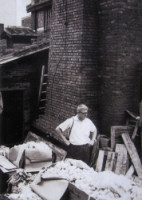
Dr. Noordhoff toured Mackay Memorial Hospital after a typhoon. (1962)
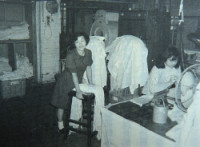
Simple laundry room at that time.
When Dr. Clarence Holleman told him that he intended to assign Dr. Noordhooff as the superintendent, Dr. Noordhooff’s face turned red. At that juncture, Mackay Memorial Hospital was faced with a financial crisis. All the buildings and medical equipment were old and tired. The morale was low. Doctors practiced outside and asked for bribery. The accounts were problematic, with issues surrounding procurement and employment.
Taking over as Superintendent
On March 1, 1960, Dr. Noordhooff took over the position as a surgeon and the superintendent in Mackay Memorial Hospital. He said, “It was a bit like a charity hospital. You only go there when you do not have money. The hospital had financial difficulties and could not pay doctors and staff on time. Many people tried hard to maintain the hospital.”
At that time, Mackay Memorial Hospital was only a two-story building, constructed during the Qing Dynasty. There were only 120 beds and less than 20 doctors. It was the hospital where the poor went to. Most of the equipment was denoted by the US. There was not even a washing machine. Bed-sheets were hand-washed and dried under the sun. There was only one suction machine so the emergency room and the surgery room had to share it. Maintenance workers would move it around to where it was needed.
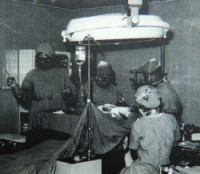
Basic surgery room at that time.
Simple Surgery Room
At that time, the surgery room used ice bricks and electric fans to maintain the body temperatures of patients from getting too high. Dr. Noordhooff said that it would be dangerous if their body temperature exceeds a certain limit. In summer, the surgery room was like a sauna. Doctors wore wooden clogs and sweated through the process. There was a small stove with boiling water to sterilize the equipment. It was in fact the best sterilization method the hospital could afford. The first surgery Dr. Noordhooff performed was for a hernia. His work was detailed, from cutting to sawing. To the surprise of local Taiwanese doctors, he did not prescribe antibiotics. They thought the patient would have got inflections. Dr. Noordhooff smiled and said that his patient would be able to walk immediately. He let him go home the next day. At that time, most patients stayed in the hospital one week after any surgery.
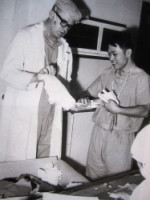
Dr. Noordhoff discussed with residents. (1966)
Siesta
One of the most amazing things Dr. Noordhooff found in Taiwan was that everybody took a nap. Even the emergency room of Mackay Memorial Hospital closed down for a siesta break because doctors, nurses and ambulance drivers all needed a nap. For the days surgeries were scheduled for, Dr. Noordhooff went to the surgery room at 7am. Hence, the junior doctors and nurses had to prepare even earlier. With the superintendent setting up a good example, nobody dared to shirk.Ms. Rui-hui Chian, a nurse, recalled that she failed to catch a scalpel and it fell right on the foot of Dr. Noordhooff. Blood rushed out of his foot immediately but Dr. Noordhooff continued with the surgery. He told Rui-hui Chian that it was OK as it was not hurting. Years later, when Dr. Noordhooff left Mackay Memorial Hospital for Chang Gung Memorial Hospital, Rui-hui Chian followed him without any questions.
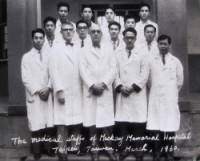
The medical team of Mackay Memorial Hospital; the second left on the front row Dr. Noordhoff and third right Dr. Holleman.
Complete Treatments
Mackay Memorial Hospital had financial difficulties, but the employees were driven. Dr. Noordhooff said this was the most important as everybody felt that there was hope. Whenever there was a major surgery, doctors would move in with the patients to observe three days and three nights.Dr. Noordhooff emphasized the importance of complete treatments. The treatments should not only focus on the body, but also cover the soul. The broadcasting of good Christian teaching throughout the hospital was too noisy, he felt. He believed that priests should visit patients to inquire their needs. He also asked the priests to report the situation of patients in English to him.
References :
Yu-fang Liang(2000).《Love, To Mend the Imperfectness: Dr. Noordhooff’s Forty Years in Taiwan》.Taipei City:Common Wealth .
Good TV(2004).《The Power of Giving》。Taipei County:Future Publishing.
Image Sources :
Yu-fang Liang(2000).《Love, To Mend the Imperfectness: Dr. Noordhooff’s Forty Years in Taiwan》.Taipei City:Common Wealth .
